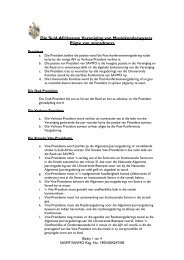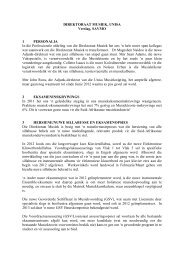2006 Edition 2 (Issue 144) - Sasmt-savmo.org.za
2006 Edition 2 (Issue 144) - Sasmt-savmo.org.za
2006 Edition 2 (Issue 144) - Sasmt-savmo.org.za
Create successful ePaper yourself
Turn your PDF publications into a flip-book with our unique Google optimized e-Paper software.
A s s e s s i n g P r o g r e s s i n M u s i c<br />
T h o r o u g h r e s e a r c h o n t h e a s s e s s m e n t o f<br />
m u s i c p e r f o r m a n c e s , r e v e a l s u n e x p e c t e d<br />
i n s i g h t s . F a r f r o m b e i n g i m p e n e t r a b l e<br />
a n d u n r e l i a b l e , i t m a y b e a p a r a d i g m f o r<br />
s u m m a t i v e a s s e s s m e n t i n o t h e r s u b j e c t s .<br />
Much has been written on assessment in music. For example,<br />
the US publication Assessing the Developing Child<br />
Musician by Tim Brophy (2000), runs to almost 500 pages.<br />
I do not intend to duplicate all that effort here, but to make<br />
some observations about what it might mean to assess<br />
progress in music musically.<br />
The system for assessing music in the national curriculum<br />
for music in England is ‘holistic’ rather than ‘segmented’.<br />
Instead of giving students marks (perhaps out of ten) for<br />
many different aspects of music, and adding them all up to<br />
give a total mark that tells you how good a student is (segmented<br />
assessment), teachers are expected to consider a<br />
student ‘in the round’ (what I would call holistically), and<br />
to consider which of the published ‘level descriptions’ they<br />
match most closely. While I have already questioned some<br />
of the content of the published level descriptions, 1 I think<br />
that this is a musical approach to assessment.<br />
Let us take the example of performance in music. As I<br />
leave a concert, I have a clear notion of the quality of the<br />
performance that I have just heard. If someone asks me to<br />
justify my view, I may start to talk about rhythmic drive,<br />
or interpretation, or sense of ensemble, for example. But I<br />
move from the whole performance to its components. I do<br />
not move from the components to the whole. In particular,<br />
I do not think: the notes were right, the rhythm was<br />
right, the phrasing was coherent, and so on – therefore I<br />
must have enjoyed this performance. And I certainly do<br />
not think something such as:<br />
SKILLS + INTERPRETATION = PERFORMANCE<br />
I recall performances that have overwhelmed me, despite<br />
there being a handful of wrong notes. I remember others<br />
in which the notes have been accurate, and the interpretation<br />
has been legitimate, and yet the overall effect has been<br />
sterile. A performance is much more than a sum of skills<br />
and interpretation.<br />
Segmented marking systems are used routinely in some<br />
other subjects, and may be appropriate in some fields of<br />
music. For example, teachers assessing students’ recall of<br />
Janet Mills<br />
factual information about music, or success in solving a<br />
mathematical problem, typically use such schemes. The<br />
point is that the assessment needs to fit the behaviour being<br />
assessed. A musical performance is not a mathematical<br />
problem.<br />
Mathematical problems are sometimes set to provide a<br />
context for the assessment of qualities such as aspects of<br />
mathematical thought. Here, it makes sense to use a segmented<br />
marking scheme that will tease out the aspects to<br />
be assessed, and to ask students to present their solutions<br />
so that they can be given a mark for each of the aspects<br />
that they have grasped. Otherwise, a student who has been<br />
through the intended thought processes, but has produced<br />
no evidence of this, and who perhaps gives an incorrect<br />
answer because of some trivial computational error at<br />
the end, for example, will not receive appropriate credit.<br />
Musical performances are not like this. There is no need<br />
for musical performance to be set in a context: it provides<br />
its own. The musical performance assessor is fortunate in<br />
being presented with the actual behaviour that he or she<br />
is to assess. It makes no sense to dissect the performance,<br />
give a mark for each of the bits, and then reassemble them<br />
by adding up the marks.<br />
One sometimes hears teachers arguing for segmented assessment<br />
on the grounds that holistic assessment is ‘subjective’.<br />
Of course, all assessment is subjective, in the sense<br />
that human beings determine how it is done. Even the<br />
most detailed mark scheme for a mathematics problem<br />
— perhaps one that justifies exactly what a student has to<br />
write in order to gain each mark — is subjective because<br />
it was designed by a human being. Other human beings<br />
might have set a different problem, or structured the mark<br />
scheme in some other way. That assessment is subjective,<br />
in the sense that human beings are involved in it, is surely<br />
something to be celebrated rather than bewailed. The material<br />
being assessed is, after all, human endeavour.<br />
Subjectively, then, I would argue is not necessarily a problem.<br />
But what of reliability? Are students who are assessed<br />
holistically more likely to be given differing marks by<br />
Suid-Afrikaanse Musiek Onderwyser |<strong>144</strong> | November <strong>2006</strong>




